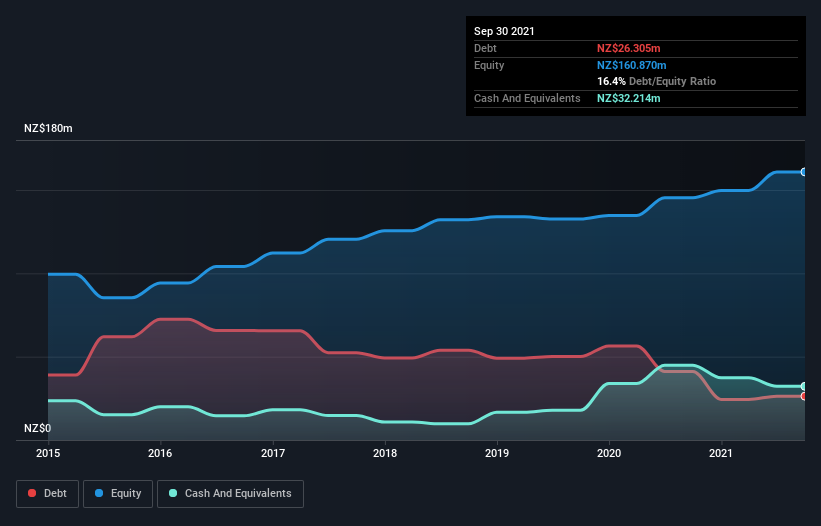Green Cross Health (NZSE:GXH) Has A Pretty Healthy Balance Sheet
The external fund manager backed by Berkshire Hathaway's Charlie Munger, Li Lu, makes no bones about it when he says 'The biggest investment risk is not the volatility of prices, but whether you will suffer a permanent loss of capital.' When we think about how risky a company is, we always like to look at its use of debt, since debt overload can lead to ruin. As with many other companies Green Cross Health Limited (NZSE:GXH) makes use of debt. But the real question is whether this debt is making the company risky.
When Is Debt A Problem?
Debt is a tool to help businesses grow, but if a business is incapable of paying off its lenders, then it exists at their mercy. If things get really bad, the lenders can take control of the business. However, a more usual (but still expensive) situation is where a company must dilute shareholders at a cheap share price simply to get debt under control. Of course, the upside of debt is that it often represents cheap capital, especially when it replaces dilution in a company with the ability to reinvest at high rates of return. When we examine debt levels, we first consider both cash and debt levels, together.
Check out our latest analysis for Green Cross Health
What Is Green Cross Health's Debt?
You can click the graphic below for the historical numbers, but it shows that Green Cross Health had NZ$26.3m of debt in September 2021, down from NZ$41.2m, one year before. But it also has NZ$32.2m in cash to offset that, meaning it has NZ$5.91m net cash.
How Healthy Is Green Cross Health's Balance Sheet?
We can see from the most recent balance sheet that Green Cross Health had liabilities of NZ$119.3m falling due within a year, and liabilities of NZ$93.7m due beyond that. On the other hand, it had cash of NZ$32.2m and NZ$49.3m worth of receivables due within a year. So its liabilities outweigh the sum of its cash and (near-term) receivables by NZ$131.4m.
This is a mountain of leverage relative to its market capitalization of NZ$174.6m. This suggests shareholders would be heavily diluted if the company needed to shore up its balance sheet in a hurry. Despite its noteworthy liabilities, Green Cross Health boasts net cash, so it's fair to say it does not have a heavy debt load!
Green Cross Health's EBIT was pretty flat over the last year, but that shouldn't be an issue given the it doesn't have a lot of debt. When analysing debt levels, the balance sheet is the obvious place to start. But you can't view debt in total isolation; since Green Cross Health will need earnings to service that debt. So when considering debt, it's definitely worth looking at the earnings trend. Click here for an interactive snapshot.
Finally, a company can only pay off debt with cold hard cash, not accounting profits. Green Cross Health may have net cash on the balance sheet, but it is still interesting to look at how well the business converts its earnings before interest and tax (EBIT) to free cash flow, because that will influence both its need for, and its capacity to manage debt. Happily for any shareholders, Green Cross Health actually produced more free cash flow than EBIT over the last three years. That sort of strong cash generation warms our hearts like a puppy in a bumblebee suit.
Summing up
Although Green Cross Health's balance sheet isn't particularly strong, due to the total liabilities, it is clearly positive to see that it has net cash of NZ$5.91m. The cherry on top was that in converted 142% of that EBIT to free cash flow, bringing in NZ$44m. So we are not troubled with Green Cross Health's debt use. When analysing debt levels, the balance sheet is the obvious place to start. But ultimately, every company can contain risks that exist outside of the balance sheet. To that end, you should learn about the 2 warning signs we've spotted with Green Cross Health (including 1 which makes us a bit uncomfortable) .
If, after all that, you're more interested in a fast growing company with a rock-solid balance sheet, then check out our list of net cash growth stocks without delay.
This article by Simply Wall St is general in nature. We provide commentary based on historical data and analyst forecasts only using an unbiased methodology and our articles are not intended to be financial advice. It does not constitute a recommendation to buy or sell any stock, and does not take account of your objectives, or your financial situation. We aim to bring you long-term focused analysis driven by fundamental data. Note that our analysis may not factor in the latest price-sensitive company announcements or qualitative material. Simply Wall St has no position in any stocks mentioned.
Have feedback on this article? Concerned about the content? Get in touch with us directly. Alternatively, email editorial-team (at) simplywallst.com.

